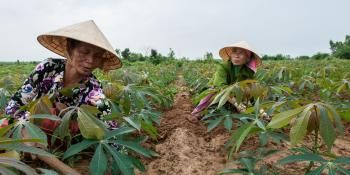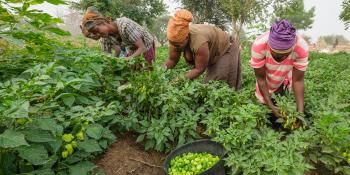Global Science Conference on Climate-Smart Agriculture
The Global Science Conference on Climate-Smart Agriculture will bring together world experts on climate-smart agriculture to provide a synthesis of the current state of knowledge in order to deliver a set of findings based on multi-disciplinary science and best practices.
The Global Science Conference on Climate-Smart Agriculture will bring together world experts on climate-smart agriculture to provide a synthesis of the current state of knowledge in order to deliver a set of findings based on multi-disciplinary science and best practices.
There is urgently a need to unearth the science of Climate-Smart Agriculture. There is a need to share knowledge and tools between scientists and policymakers and to make science more comprehensible. Identified best practices for enhanced productivity, increased resilience and low carbon agriculture can be effectively translated into policy actions. The Global Science Conference on Climate-Smart Agriculture will bring together world experts on climate-smart agriculture to provide a synthesis of the current state of knowledge in order to deliver a set of findings based on multi-disciplinary science and best practices.
For agriculture to be given the right emphasis in future climate change agreements, tangible, quantifiable evidence to support actions is needed. GSCSA will demonstrate the potential for innovative sustainable landscape management practices in productivity enhancement, and climate change mitigation and adaptation. Scientific papers will illustrate the feasibility and constraints of climate-smart agriculture in different ecosystems across all regions.
The Global Science Conference on Climate-Smart Agriculture will include both plenary and workgroup sessions. The workgroups are the core of the conference. The first session will focus on information and discussion (diverging session). The second session will focus on recommendations for interventions, the scientific agenda to make that intervention possible and –if possible- the policies needed to implement that agenda (converging session). Preferably, each workgroup drafts a show-case that addresses the triple win (enhanced productivity and food security, increased climate resilience and reduced carbon emissions growth) and on implementation will promote Climate-Smart Agriculture.
Target audience
The target audience would be scientists from OECD and developing countries, private and public sector as well as other non-state actors. Participants will be invited to express their interest. Selection may be needed because of limited space. When budget can be found, fellowships will be made available to cover traveling expenses for young researchers and researchers form developing countries.
Objectives
The objectives of the GSCSA are:
1. to take stock of the current state of global knowledge of the science and best practices concerning climate smart agriculture, in OECD and developing countries, and among private and public stakeholders;
2. to identify key priorities for further knowledge development
3. to summarize key findings for discussion at Durban and the follow up global conference on Food Security and Climate Change in Vietnam in early 2012.
Workgroups
The six workgroups will cover the following areas:
- Soil, Water and Nutrient Management
- Breeding for a 2030 World
- Greenhouse gas foot printing: Promise or Peril?
- Climate Risk Management in Agriculture
- Integrated feed-food-energy Systems
- Socio-Economics of Climate-Smart Agricultural Practices
This international conference is organised by Wageningen UR, in close collaboration with the Dutch Ministry of Economic Affairs, Agriculture and Innovation and the World Bank. The CGIAR Research Program on Climate Change, Agriculture and Food Security (CCAFS) will participate in the event.


